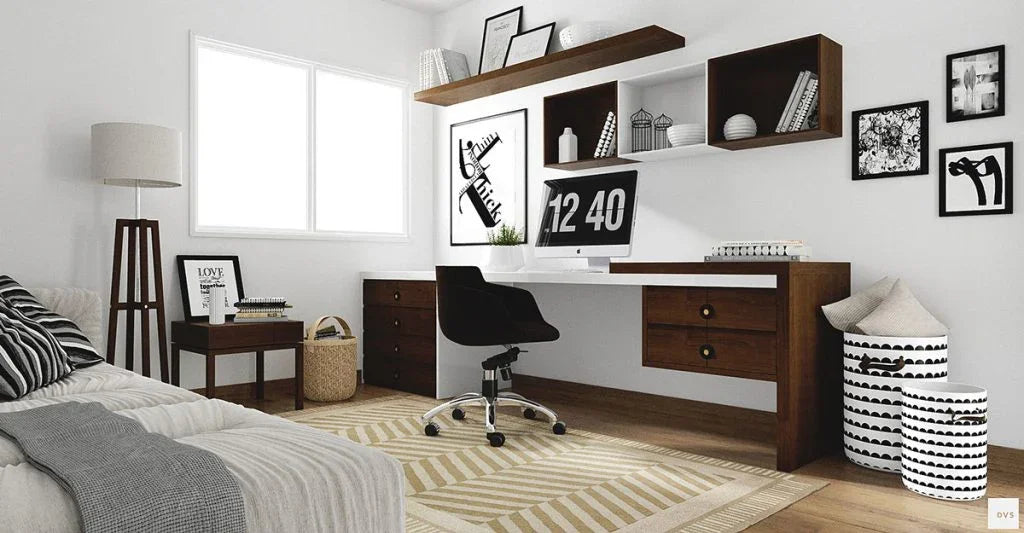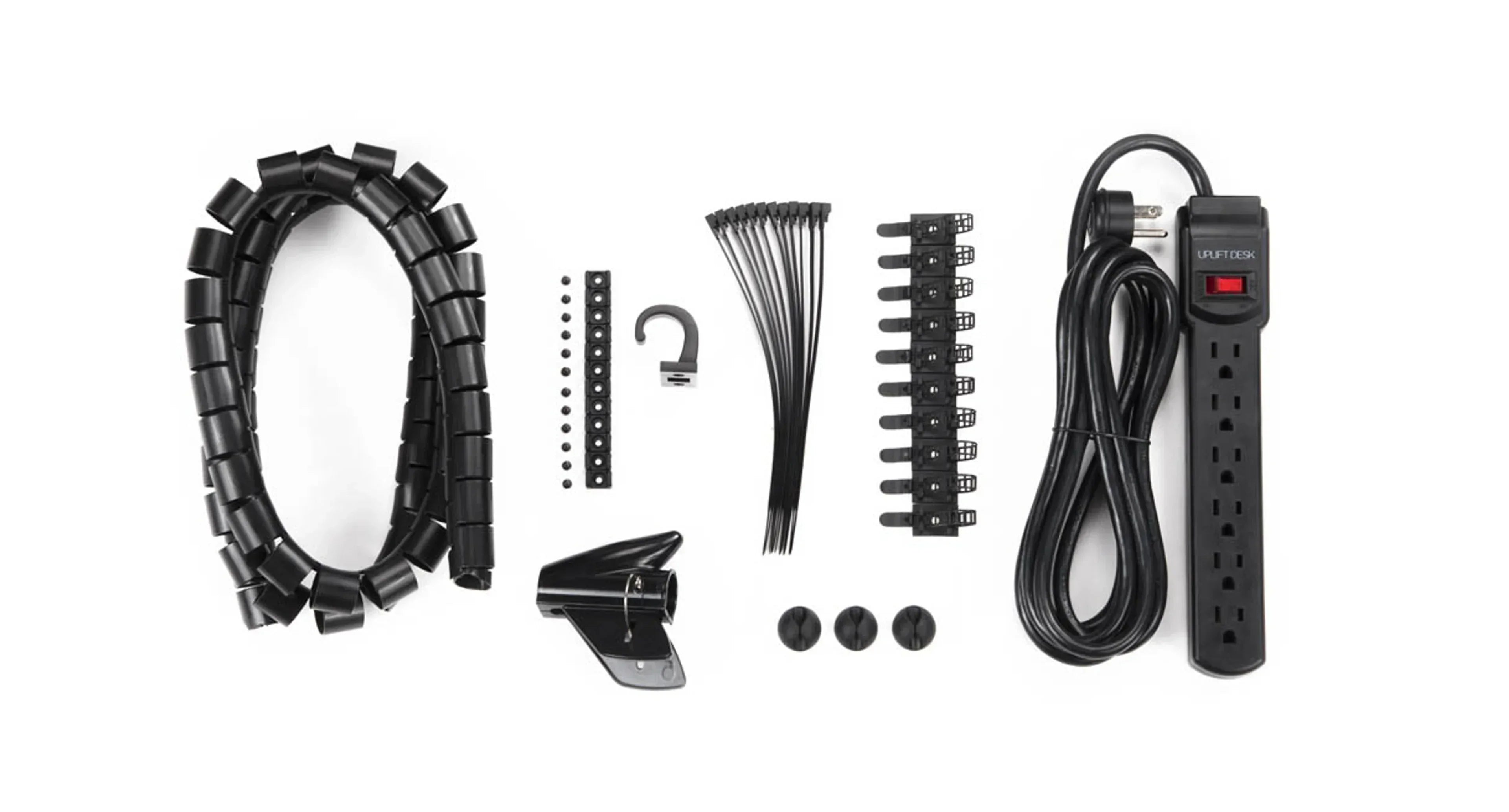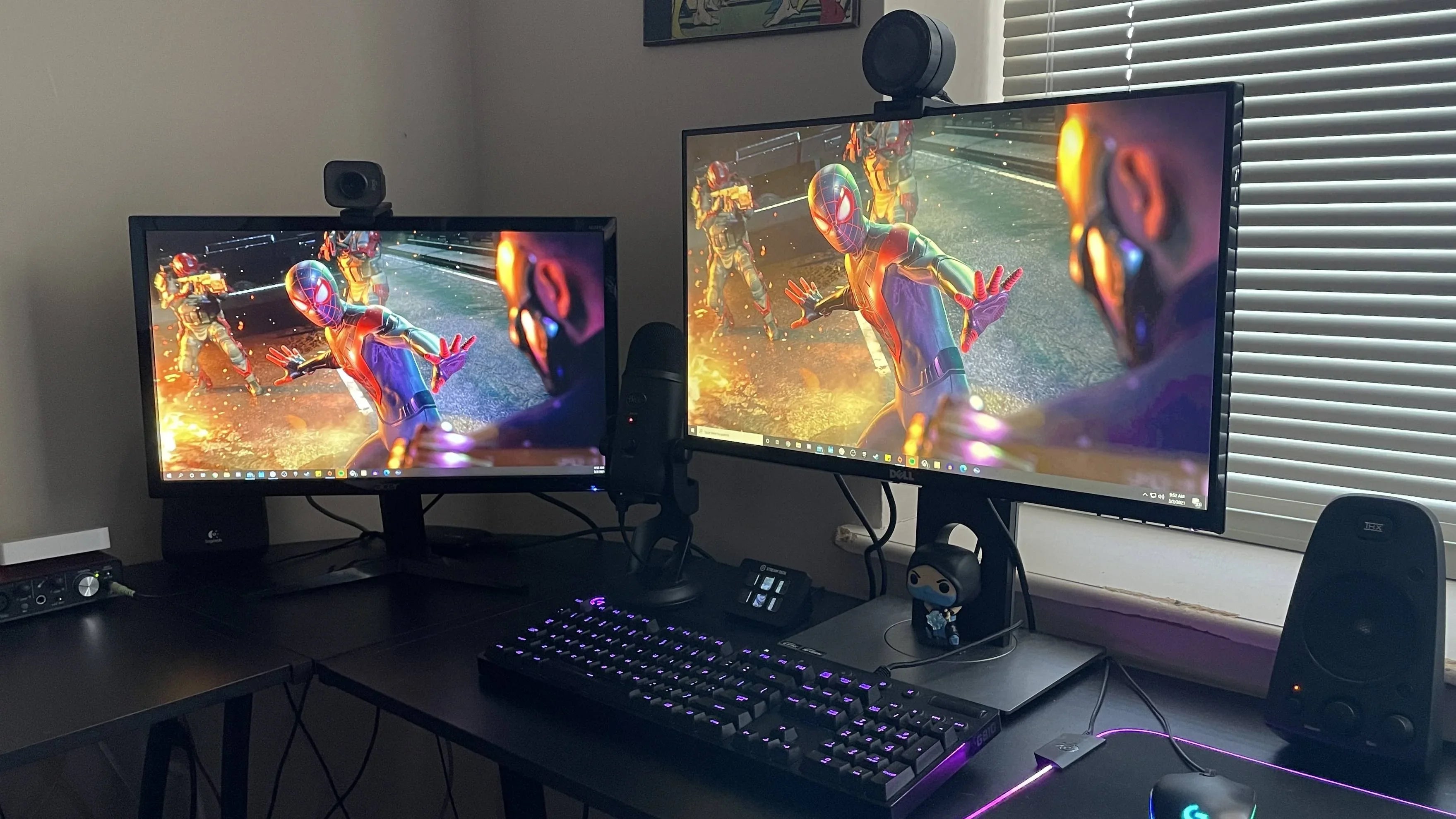With many advances in the digital landscape, dual curved monitor setup has emerged as a go-to choice for professionals and gamers alike, offering an immersive visual experience that traditional flat displays simply cannot match. This article will explore the benefits, key considerations, and best practices for setting up dual curved monitors.
What is a Dual Curved Monitor?
A dual curved monitor setup refers to a display with a curved screen designed to deliver a more immersive and ergonomic viewing experience. It is especially popular in multi-monitor setups, where two curved screens are placed side by side to create a panoramic effect that enhances peripheral vision.

Unlike flat screens, curved monitors mimic the natural curvature of the human eye. This ergonomic approach reduces eye strain during long sessions while creating a more immersive viewing experience. Placing two side by side can create a panoramic effect that wraps around your peripheral vision.

The curvature of monitors used for dual curved monitor setup is measured by their radius – typically ranging from 1000R (more curved) to 4000R (less curved). The smaller the number, the more pronounced the curve, with 1800R and 1500R being popular choices that balance immersion with practicality.
Looking to explore alternative configurations? Learn how to set up stacked monitors for your home office or dive into dual monitor setup ideas for added inspiration.
Benefits of a Dual Curved Monitor Setup
- Enhanced Field of View
Curved monitors mimic the natural curvature of the human eye, providing a more immersive experience. With a dual setup, you can expand your visual workspace without excessive head movement, reducing eye strain.
- Improved Productivity
A dual curved monitor setup allows for better multitasking. You can run multiple applications side by side, improving workflow and efficiency. This is ideal for content creators, developers, and business professionals.
Tip: If you're managing complex projects, a 3-monitor setup might also be worth considering.
- Superior Gaming Experience
For gamers, a dual-curved monitor setup enhances peripheral vision, creating a more immersive and engaging environment. It also provides better depth perception, which is crucial for fast-paced and first-person games.
- Reduced Eye Strain
The gentle curve of the monitors reduces the need for your eyes to constantly refocus across flat screens, leading to less fatigue during long hours of use.
- Better Multitasking
Curved monitors mimic the natural curvature of the human eye, providing an immersive experience and a wider field of view for handling multiple applications simultaneously.
- Reduced Eye Strain
The gentle curve follows your natural field of vision, reducing the need to refocus as you scan up and down
- Enhanced Immersion
The wrap-around effect creates a more engaging experience for both work and gaming
- Better Viewing Angles
Curved screens minimize distortion at the edges of your display
- Aesthetic Appeal
A dual curved vertical setup can also elevate the visual appeal of your desk. Learn how a vertical monitor setup can bring style and functionality to your workspace.
Selecting the Right Curved Monitors
When choosing monitors for a dual setup, the specifications matter. Refer to the chart of key specifications as below for an in-depth breakdown, and remember: If you're scaling up to more than two monitors, the best 4-monitor setup guide offers comprehensive tips for larger workstations.
| Specification | Details |
| Screen Size | 27 to 32 inches is ideal for dual setups |
| Curvature Rating | 1500R to 1800R for a more immersive experience |
| Resolution | 1440p (QHD) or 4K for sharper image quality |
| Refresh Rate | 120Hz or higher for smoother motion (especially for gaming) |
| Panel Technology | IPS for better color accuracy, VA for deeper contrast |
| Connectivity | Ensure compatibility with HDMI, DisplayPort, or USB-C |
| Mounting Options | Check for VESA compatibility for monitor arms |
| Color Accuracy | Ideal for creatives working on design or editing |
| Response Time | 1ms to 5ms for minimal motion blur and faster screen transitions |
| Ergonomics | Adjustable height, tilt, and swivel for better comfort |
| Built-in Features | Blue light filters, HDR support, and integrated speakers, … |
How to Set Up Dual Curved Monitors
By following these step-by-step guides, you'll create an ergonomic, productive, and visually stunning dual curved monitor workstation that enhances your digital experience.
Step 1. Choose the Right Monitors
Before diving into setup, it's crucial to select compatible monitors:
- Matching curvature: Look for monitors with the same curve radius (measured in R, like 1000R or 1500R) for a seamless visual experience
- Size and resolution: Choose identical or similar-sized monitors with matching resolutions for consistency
- Connectivity options: Ensure your monitors have the necessary ports (HDMI, DisplayPort, USB-C) compatible with your computer
- VESA mount compatibility: Verify mounting options if you plan to use monitor arms.
You'll need the following equipment:
- Two curved monitors
- A computer with sufficient graphics capabilities
- Appropriate cables (HDMI, DisplayPort, or USB-C)
- Dual-monitor stand, monitor arm, or sturdy desk
- Power strip with surge protection
Step 2. Position Your Monitors
Curved monitors work best when positioned correctly:
- Place monitors side by side with minimal gap between them
- Angle the monitors slightly inward (10-15 degrees) to create a more immersive field of view
- Ensure the curve of both monitors creates a continuous arc when viewed from your seated position
- Position your primary monitor directly in front of you, with the secondary monitor to the side
- Allow adequate desk depth (at least 24-30 inches) to accommodate the curved design
Step 3. Adjust Monitor Heights and Manage Cables
Correct monitor height is essential for ergonomics and comfort:
- Position the top of your monitors at or slightly below eye level
- Both monitors should be at identical heights for a seamless visual experience
- Your gaze should angle slightly downward (about 15-20 degrees) when looking at the center of the screens
- Use the monitors' built-in height adjustment features if available
- Consider ergonomic guidelines to prevent neck strain during extended use
Step 4. Use a Monitor Arm
A quality monitor arm products from Spacet to offer flexibility and improved ergonomics:
- Choose a dual monitor arm rated for the weight and size of your curved monitors
- Ensure the arm is VESA compatible with your monitor mounting patterns
- Look for arms with independent height, tilt, and swivel adjustments
- Securely attach the arm to your desk using a clamp or grommet mount
- Route cables through the arm's cable management system for a cleaner setup
- Adjust tension settings for smooth movement and stable positioning
Step 5. Configure Display Settings
For Windows:
- Right-click on your desktop and select "Display settings"
- Arrange the monitors to match their physical layout
- Set your primary display (usually the center monitor)
- Choose "Extend these displays" from the multiple displays dropdown
- Match resolution and scaling settings across both monitors
- Adjust refresh rates to their maximum supported values
For Mac:
- Go to Apple menu > System Preferences > Displays
- Click the "Arrangement" tab
- Drag the monitor icons to match your physical setup
- Uncheck "Mirror Displays" to extend your desktop
- Adjust resolution settings for optimal clarity
Additional Tips for a Perfect Dual Curved Monitor Setup
- Cable management: Use cable clips or sleeves to organize cables neatly. This improves airflow and keeps your desk tidy.
- Eye comfort: Enable blue light filters and adjust brightness to reduce eye strain. Consider using ambient lighting to reduce screen glare.
- Color calibration:c Match color profiles across both monitors for visual consistency
- Ergonomic chair and desk: Pair your setup with an ergonomic chair and adjustable desk to maintain proper posture during extended use.
- Regular breaks: Follow the 20-20-20 rule: every 20 minutes, look at something 20 feet away for 20 seconds to rest your eyes.
- Lighting considerations: Minimize glare by positioning monitors away from direct light sources
- Graphics capabilities: Ensure your computer's graphics card can efficiently drive both displays
- Software tools: Consider display management applications for enhanced control of window positioning
Conclusion
A dual curved monitor setup offers substantial benefits for both productivity and gaming. By choosing the right monitors, optimizing your workspace, and following best practices, you can enhance your work efficiency and enjoy a more immersive gaming experience. For more insights and high-quality products to elevate your setup, follow Spacet's blog and stay updated on the latest in tech and workspace innovation.







Share: